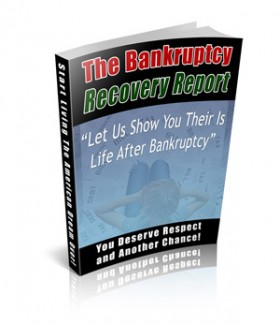 License Type: Master Resell Rights
License Type: Master Resell Rights  File Size: 50,298 KB
File Size: 50,298 KB File Type: ZIP
File Type: ZIP
 SKU: 14594
SKU: 14594  Shipping: Online Download
Shipping: Online Download
Sample Content Preview
Introduction
PLEASE NOTE: We have left room on the left hand side so you can place notes if you print this out.
Bankruptcy is the last resort that people turn to in order to deal with their major debts. Nobody ever wants to declare bankruptcy; however it is still a fact of life when you get in over your head. Bankruptcy is not something that you should be playing with. There are many people that will declare bankruptcy because they think this is an easy way out of debt. That is not true. In fact, declaring bankruptcy makes life quite a bit harder.
While many people need to file for bankruptcy these days, not everyone knows that they can rebuild their credit afterward. Most people think that bankruptcy is a terrible thing that you carry around with you forever. This is not true. Unfortunately, you will have to carry this around for a few years, but not forever.
Once you have declared bankruptcy, you will find that it will be very difficult to get credit for major purchases like houses, cars and personal loans. It may be difficult, but it is not impossible. That’s the best part. You can rebuild your good credit standing after you have declared bankruptcy. This is going to be your comprehensive guide to rebuilding your credit and bounce back from bankruptcy. You will learn: what bankruptcy really is, why people have to declare bankruptcy and how to rebuild your credit once you have declared bankruptcy. You will even learn why bankruptcy could be a good thing for you. Although bankruptcy is a last resort to paying off your creditors, it doesn’t have to be your last stop. You can build your credit back up and I am going to show you how to do it!
Understanding The Ins and Outs of Bankruptcy
When you are forced to declare yourself bankrupt it is one way of dealing with debts you can no longer manage. But it is not a decision that should be taken lightly. Bankruptcy is a serious matter that will affect the way you are dealt with by the creditors you wish to establish a relationship for many years after you've been discharged.
Bankruptcy is not a fun thing to do or an easy out for those who are buried in debt. It is a way to help those who simply can’t see a way out of debt and who don’t have the means to pay their debts to get the help that they need. Basically how it works is that you declare yourself bankrupt and the government covers your debt and you are rendered to creditors as ‘broke’. This inevitably means that your record will show that you couldn’t pay your debts. This makes it very hard for creditors to trust you.
Recent Bankruptcy changes
The bankruptcy laws changed in April 2004, and these changes made it easier for people to declare themselves bankrupt by reducing the time it takes to get rid of bankruptcy from three years to one year or less. This change was meant to assist people in getting back on their feet again. For private individuals; which are those that are not running businesses, the effects of personal bankruptcy can be far harder to deal with.
Pros and cons to Bankruptcy
The fact is that you shouldn’t become bankrupt just because you're struggling with debts. Like I said before, this should only be used as your last resort. The reason for this is because you may be required to give up most of your belongings as a result of it. Some of these might include; salary and any investment in your house.
If you own any property or shares in businesses these may have to be sold to pay back the money you owe as well. This means that you could lose your family’s house should you decide to go bankrupt. Even if it is jointly owned by you and a spouse or parent, you may be forced to sell it so your share of the proceeds can be used to repay debts.
I will say though that under new rules, if the trustee that is appointed by the court has not sold the bankrupt's home within three years, it no longer counts as part of the estate and may not be reclaimed by you. I wouldn’t hold my breath though. This isn’t all you could lose either. If you come into any money while the bankruptcy order is still in place, this could also be taken away from you. This money could come from the lottery, or an inheritance. Of course, you could also find yourself credit blacklisted for up to 15 years. So you should really think before filing for bankruptcy.
Bankruptcy is best for someone with considerable debts, no income and no assets. The people it has the highest effect on are those that actually have equity in property, disposable income and people that have professional qualifications because they stand to lose the most. For example, a lawyer should try to avoid it because they won't be able to practice law once they have filed for bankruptcy.
The alternatives to Filing for Bankruptcy
You could write to your creditors and seek an informal arrangement that allows you to pay back your debts over a specific time that they agree on. The only disadvantage to doing this is that it won't be legally binding and your creditor might choose to ignore it later on and seek direct payment.
If your debts are relatively small like $5000 or less and you have a regular income the court may agree to set up an order so that you can pay your creditors each month but through the court. Of course, for debts this small a credit union might be your best bet. These are basically just banks that are set up to direct your wages toward your debtors, but they will also help to reduce the payments for you and in some cases even delete some of your creditors all together.
If you do have severe debt problems, such as debts over $10,000, you may have to turn to bankruptcy to help you. You may also set up payment arrangements with your creditors. You can make an agreement between you and your creditors that will allow you to repay a percentage of the debt over a set period of time, which is usually around five years.
- File Size:50,298 KB
- License: Master Resell Rights
- Category:Ebooks
- Tags:2010 Ebooks With Video Master Resale Rights








